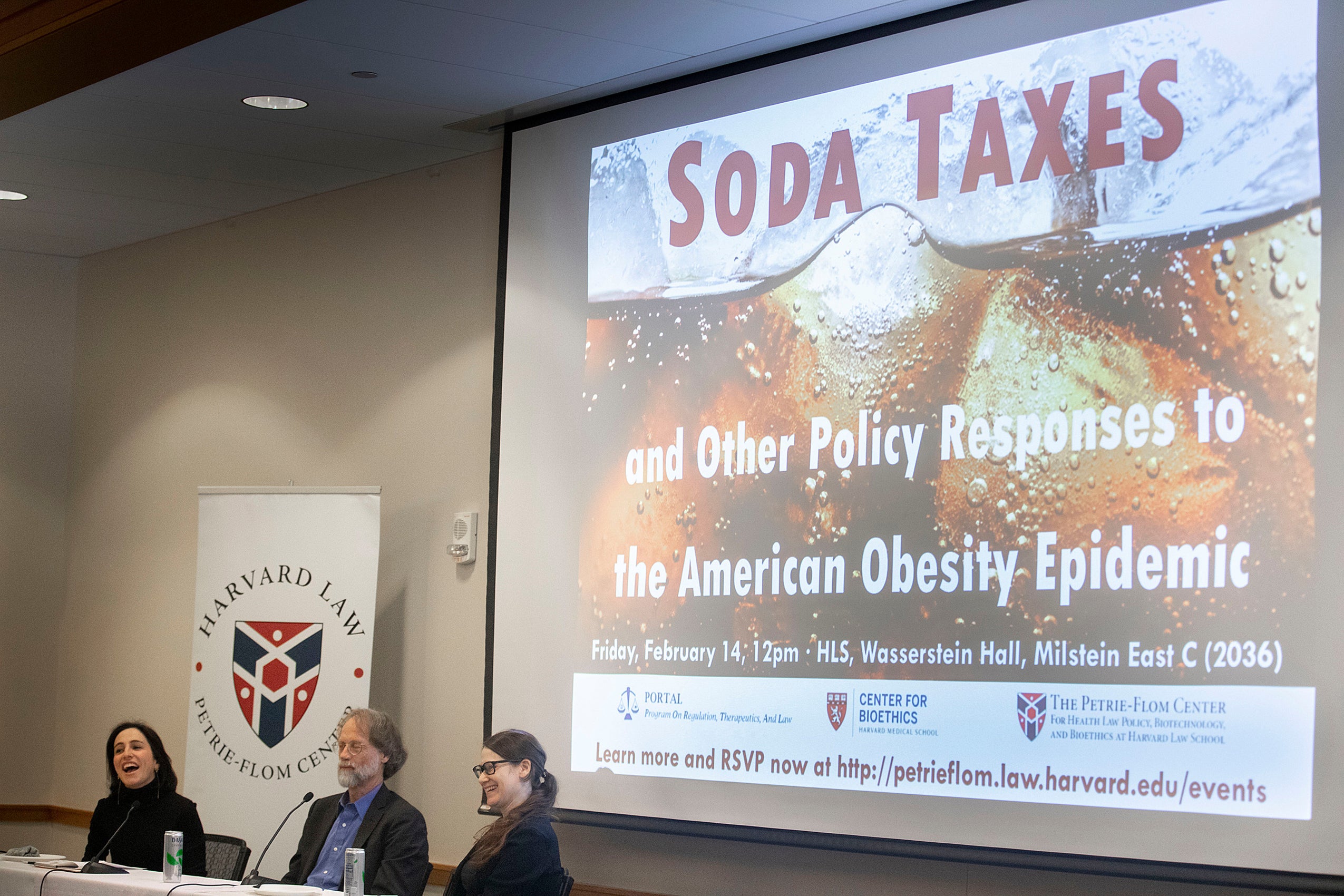Petrie-Flom Center hosts discussion of levy on sugary beverages
Amid rising rates of diabetes and obesity in the nation, Berkeley, Calif., became the first American city to institute a sugary-drink tax, generally referred to as a soda tax, in 2015.
Since then a handful of jurisdictions, such as Philadelphia, Seattle, and Boulder, Colo., have passed similar measures. Other proposals have failed at the ballot box or been rescinded. New York proposed a rule capping portion sizes in 2012, which was successfully challenged in state court.
The regulation push-pull continues as soda-tax citizen advocates and public-health professionals brace for the long haul and draw lessons from the tobacco wars about how tough a fight lies ahead against a deep-pocketed industry adept at political and public relations warfare.
“I think it’s a question of time” before soda taxes become more common, said Steven Gortmaker, professor of the practice of health sociology at the Harvard T.H. Chan School of Public Health. “It’s a battle, though.”
In some ways, the obesity epidemic itself is an ally of those supporting a tax: It’s not going away and it’s only going to get worse. A study by Gortmaker and colleagues published in December projected that in 10 years, half the adults in America will be obese and a quarter severely obese. Obesity won’t be uniformly distributed, however, and more than half the population will be obese in 29 states. A related study, he said, shows that more than half of U.S. children will be obese by age 35.
“Consuming sugary beverages every day slowly kills you,” Gortmaker said. “I know it sounds terrible, but it’s kind of like cigarettes. In the short run it doesn’t have too much effect, but that excess weight gain does accumulate. … Twenty, 30, 40 years later it’s called obesity or severe obesity.”
While soda taxes can be effective — Berkeley’s resulted in an estimated 52 percent drop in consumption of sugary drinks — they can also raise significant funds. Philadelphia’s tax, for example, has raised $70 million a year.
Though diet is complicated, sugary drinks are a relatively clear target, Gortmaker said. American diets are awash in added sugar, more than half of which comes from sugary drinks, he said. Raising taxes as a way to cut consumption is a tried-and-true governmental approach, one that worked well with tobacco and that takes advantage of existing tax-collecting infrastructure, rather than requiring elaborate new programs.
Emily Broad Leib, clinical professor of law and head of Harvard Law School’s Food Law and Policy Clinic, said that along with obesity, rates of diabetes have risen until the condition now affects nearly 10 percent of the population. Fifty years ago, she said, less than 1 percent of Americans had Type 2 diabetes.
“We have a really serious health crisis going on,” Broad Leib said. “People are ill and not able to live a long and healthy life.”
Gortmaker and Broad Leib discussed sugar-sweetened beverage taxes at Harvard Law School’s Wasserstein Building on Friday. The event was sponsored by the School’s Petrie-Flom Center for Health Law Policy, Biotechnology, and Bioethics, together with Harvard Medical School’s Center for Bioethics and Brigham and Women Hospital’s Program on Regulation, Therapeutics, and Law. The hourlong event was moderated by Petrie-Flom Center Executive Director Carmel Shachar.
While soda taxes can be effective — Berkeley’s resulted in an estimated 52 percent drop in consumption of sugary drinks — they can also raise significant funds. Philadelphia’s tax, for example, has raised $70 million a year.
Broad Leib said the experience of Cook County, Ill., indicates the difficulty of the fight ahead, however. The county, which includes Chicago, approved a sugar-sweetened beverage tax in 2016, only to repeal it under pressure from retailers and others a year later.
Opponents attack the taxation efforts as increasing the “nanny state” and impinging on individual autonomy — even if an individual’s choices aren’t the healthiest ones. Opponents argue that the taxes hurt local businesses, an argument that studies show does bear some weight, as Philadelphia’s experience shows an increase in sweetened beverage sales in surrounding communities.
In the courts, the rulings have hinged on quirks of each case and, while the courts have struck some provisions against sugary beverages, they haven’t ruled that the taxes are unconstitutional. One problem, Broad Leib said, is that the cases are expensive to defend, a reality that can act as a deterrent in some communities.
The fight against tobacco has also been difficult, Gortmaker, but has seen success, which he traced to three things: ending television advertising, taxing tobacco, and banning smoking in public places.
“Those three things really changed the landscape in America,” Gortmaker said, “and I think you can draw a direct analogy to what we can do with sweetened beverages.”
